The air quality was so bad I coughed the entire time I was there
By Mary Brant, Regional Communications Manager
Dr. Hastings continued to
see scheduled patients throughout the day, getting updates from staff between
appointments. In addition to her professional career, she had served as a Red Cross
Disaster Mental Health Volunteer for nine years. At the end of that long,
stressful workday she immediately went to her local Red Cross office to help
answer calls. The phones never stopped ringing. Later that evening, the head of
Red Cross Volunteer Services called to ask if she would go to New Jersey to
help people trying to locate their missing family members.
Less
than 24 hours after the attacks, Dr. Hastings was on her way to New Jersey. Her
mission was to support the disaster response on the ground based out of the
Tri-County Red Cross Chapter offices.
“When I arrived at my
assigned site the feeling on the ground was pure chaos,” said Dr. Hastings. “I
heard stories in those first days that I have never shared because they were so
heartbreaking.”
She spent 19 days on the ground in New Jersey
helping families of 9/11 victims. The air quality was still so bad she remembers
coughing from the time she arrived.
The day after Christmas, 2001, Dr. Hastings
deployed again to the Compassion Center at Liberty Park in New Jersey. Although
busy, she found the environment less intense than her initial deployment. At this
point the 9/11 disaster site was no longer a search and rescue mission, it was
considered a recovery mission.
“Everyone experienced some degree of
trauma on September 11th whether they lost someone, were survivors themselves
or watched it unfold on their television,” said Dr. Hastings. “Disasters affect
everyone differently. Those of us who deploy for the Red Cross couldn’t do it
without the support of family, friends and colleagues still at home.”
More than 57,000 Red Crossers, just like Dr.
Hastings, came from across the country to serve more than 14 million meals and
snacks, opened dozens of shelters for people who were left stranded and
connected some 374,000 times with people to provide emotional support and
health services.
Now as we mark the 20th anniversary of that horrific day, we remember the victims, honor the brave responders and rekindle the spirit of service to help our neighbors in need.






%20(1).jpg)
Comments
Post a Comment